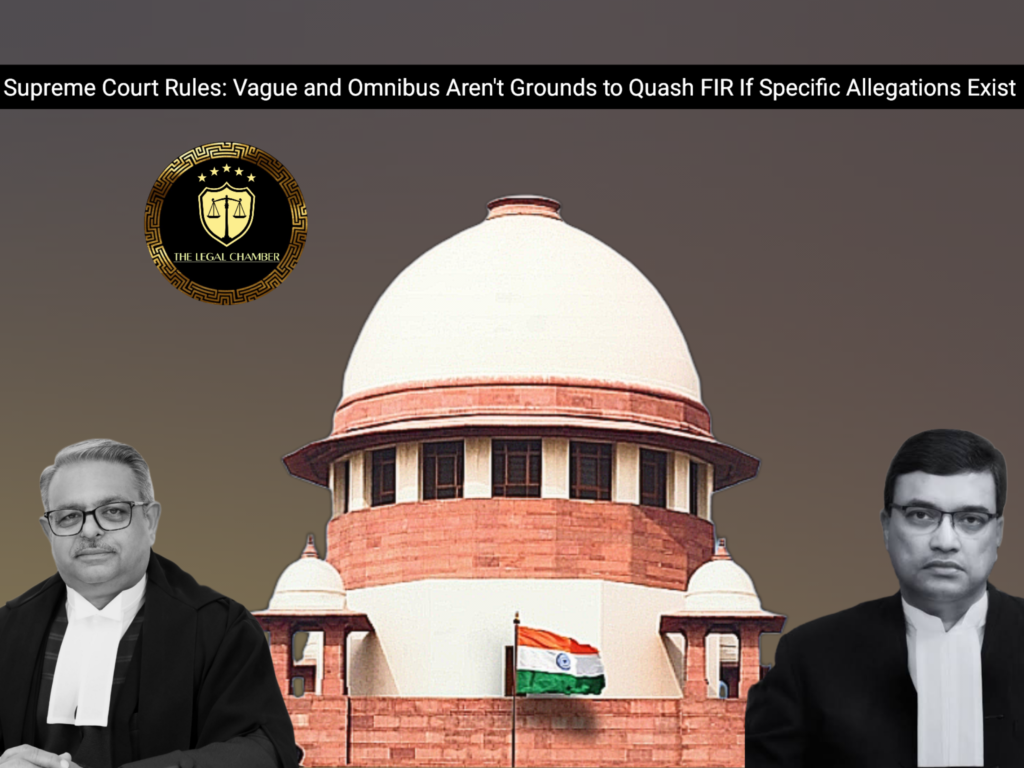
The Supreme Court held that the High Court erred in quashing the FIR under Section 482 CrPC, ruling that the allegations contained specific details of dowry demands with dates and particulars, which prima facie disclosed offences under the Dowry Prohibition Act, 1961. The Court clarified that factual defences like misrepresentation are to be adjudicated at trial and cannot be grounds for quashing at the preliminary stage.
Facts Of The Case:
The case originated from an FIR lodged by the first appellant, Krishnakant Kwivedy, against the respondents for offences under the Dowry Prohibition Act, 1961. The complaint alleged that negotiations for the marriage between the second appellant (Kwivedy’s daughter) and the fifth respondent broke down due to dowry demands. Specific allegations were made against the second to fourth respondents (the father, mother, and brother of the prospective groom). These included a demand for ₹10 lakhs and a vehicle made by the fourth respondent during a visit on 4th June 2016, and the subsequent acceptance of ₹2 lakhs in cash, clothes, and silverware during the ’tilak’ ceremony on 10th July 2016. A further demand for ₹10 lakhs and a car was made by the third respondent over the phone on 21st August 2016, after which the marriage was called off when the demands were not met. The High Court quashed the proceedings against the second to fourth respondents, characterizing the allegations as vague and omnibus. This led to an appeal before the Supreme Court challenging the High Court’s order.
Procedural History:
The procedural history of this case began with the registration of FIR No. 608 of 2016 at Mohan Nagar Police Station on 29th November 2016. After investigation, a charge-sheet was filed before the trial court on 27th May 2018. The second to fourth respondents then approached the High Court of Chhattisgarh at Bilaspur by filing a petition under Section 482 of the Code of Criminal Procedure, 1973, seeking to quash the FIR and subsequent proceedings. The High Court, vide its judgment and order dated 20th August 2024, allowed the petition and quashed the proceedings against them. The appellants, aggrieved by this order, filed a Special Leave Petition (SLP (Cri.) No. 3037 of 2025) before the Supreme Court of India, which granted leave and culminated in the present criminal appeal.
READ ALSO:Beyond Impeachment: Supreme Court Validates Its Internal Mechanism for Judicial Misconduct
Court Observation:
The Supreme Court observed that the High Court committed a serious error in quashing the FIR. It found the allegations against the respondents were specific, detailing particular demands for money and goods on specific dates, which prima facie disclosed offences under the Dowry Prohibition Act, 1961. The Court held that the High Court’s characterization of these allegations as “vague and omnibus” was incorrect. It further clarified that a defence of misrepresentation, raised by the respondents, was a factual dispute to be adjudicated during trial and could not be a valid ground for quashing proceedings under Section 482 CrPC. The Court also concluded that the case did not fall within any of the categories established in the Bhajan Lal precedent for exercising the inherent power to quash an FIR.
Final Decision & Judgement:
The Supreme Court allowed the appeal and set aside the impugned order of the High Court. The final decision held that the High Court erred in exercising its inherent powers under Section 482 of the CrPC to quash the proceedings against the second, third, and fourth respondents. The Court directed that the criminal proceedings arising from the FIR be reinstated and taken to their logical conclusion in accordance with the law. It was expressly stated that none of the observations made in this judgment should influence the trial court during the subsequent proceedings. No costs were awarded.
Case Details:
Case Title: Krishnakant Kwivedy & Another vs. State of Chhattisgarh & Others Citation: 2025 INSC 958 Criminal Appeal No: [Arising out of SLP (Cri.) No. 3037 of 2025] Date of Judgement: August 08, 2025 Judges/Justice Name: Justice Dipankar Datta and Justice Augustine George Masih